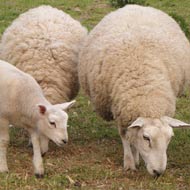
New study may have implications for live vaccine use
The repeated emergence of bluetongue virus (BTV) in European livestock has been shaped by its ability to re-assort its genes, scientists say.
Findings from a new study also suggest the use of live virus vaccines may be contributing to the development new BTV strains.
The virus - which affects ruminants such as cattle and sheep - is spread by biting midges and can be fatal. It also has indirect impacts such as weight loss, reduced milk production, abortions and deformed calves.
Until the late 1990s, it was thought to be absent from most of Europe, but since then, multiple strains have emerged, with new strains appearing each year.
An outbreak that started in the Netherlands in 2006 spread across the whole European community, causing the deaths of more than two million sheep.
It is a segmented virus, which means its genome is divided into multiple parts.
When the same cell is infected by two segmented viruses of the same species, their progeny can incorporate segments from either of the 'parent' viruses. This process is known as 're-assortment' and it is an important factor in the creation of zoonotic flu strains, such as avian and swine flu.
Scientists from the University of Glasgow and the Pirbright Institute analysed the re-assortment patterns of BTV in Europe.
Dr Roman Biek said that while much attention has been paid to re-assortment in certain viruses - particularly influenza A - its frequency and biological consequences remain poorly understood in many others.
The team's findings have important implications for the use of live vaccines to control outbreaks, he added. "By introducing live attenuated virus vaccines, we may be contributing to the genetic variation of BTV, and the creation of novel strains whose properties we know nothing about.
"This needs to be considered during the design and implementation of control strategies."
The findings have been published in the journal PLoS Pathogens.



 The veterinary mental health charity Vetlife is inviting the veterinary community to join it for a sponsored cold-water dip.
The veterinary mental health charity Vetlife is inviting the veterinary community to join it for a sponsored cold-water dip.